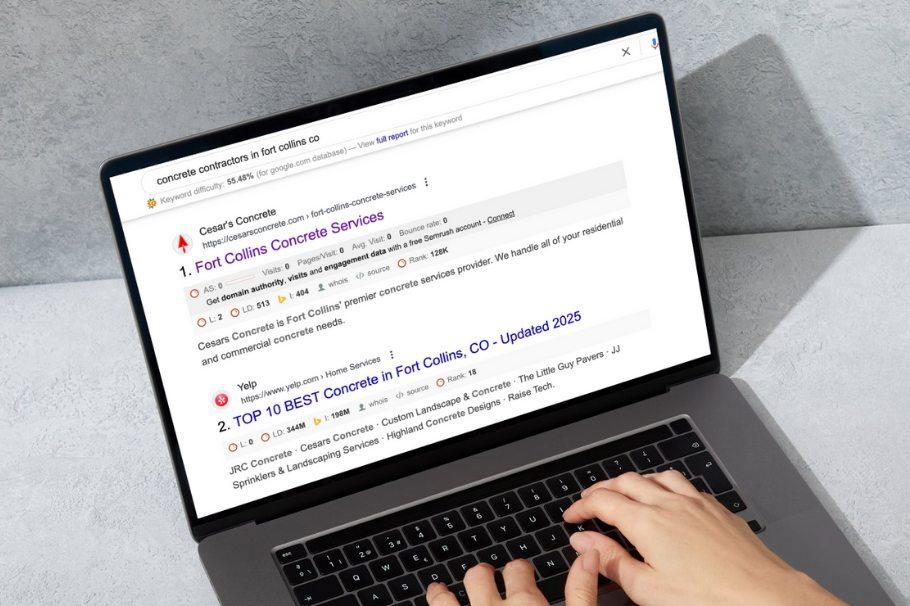10 Tips to Optimize Your Contracting Business Website

You're great at building things, but making a website for your contracting business might not be your thing. No worries! Building websites is a lot like building structures. Both need the right pieces put together in the right way to get the best results. To help you, here are ten easy tips to make sure your website works for you, not against you.
1. Choose the Right Foundation: CMS or Custom Code?
Did you know that over 62% of websites are built using a Content Management System (CMS) like WordPress? WordPress alone powers about 43.3% of all websites globally, making it the most popular CMS out there (Source: ThemeIsle, MobiLoud).
When you're starting a website, the first big decision is whether to use a CMS like WordPress or build the site from scratch using HTML, CSS, and JavaScript. Each choice has its ups and downs. Building from scratch gives you complete control, so you can create a website that’s perfectly tailored to your needs. But using a CMS is much easier, especially if you're not a coding expert. Plus, it comes with a bunch of themes and plugins that make things like SEO and design a breeze.
To help you figure out what’s best for you, here’s a quick comparison between using a CMS and going with custom code:
| Feature | CMS (Content Management System) | Custom Code |
|---|---|---|
| Development Time | Faster to set up with ready-made templates | Takes longer since it’s built from scratch |
| Cost | Usually cheaper to start | More expensive because it’s custom work |
| Flexibility | Limited by what the CMS offers | Super flexible—you can do whatever you want |
| Ease of Use | Easy to use, no coding needed | You need to know how to code |
| Maintenance | Easy, with regular updates | Needs ongoing help from a developer |
| Scalability | Can be limited by the CMS | Can grow and expand as much as you need |
| Security | Depends on the CMS | Can be more secure, but it depends on the code quality |
| Customization | Limited to available themes and plugins | Fully customizable to your exact needs |
| Community Support | Lots of help and resources available | Limited support, mainly from the developer |
| SEO Optimization | Comes with built-in SEO tools | Can be optimized a lot, but takes more work |
Source: Ithoot
2. Follow Core Web Design Principles
First impressions matter, and 94% of them are based on a website’s design (Source: ThemeIsle). This makes it crucial for your contracting business website to be both attractive and easy to use. To make sure your site leaves a positive impact, follow these simple design tips:
- Design with your audience in mind.
- Use bold, easy-to-read fonts.
- Keep things clean by using white space to draw attention to important elements.
- Make navigation intuitive and easy to follow.
- Choose a color scheme that sets the right mood for your business.
- Ensure your website is responsive and accessible to everyone, including those with disabilities.
3. Simplify Navigation
Keeping your website’s navigation simple is crucial for keeping visitors around. Websites with easy-to-use navigation can keep 50% more users compared to those that are tricky to figure out (Source: ThemeIsle). To make your site easy to navigate, keep your menus simple and place them where people expect, like at the top or side of the page. Add a search bar so visitors can quickly find what they’re looking for. And instead of cramming your homepage with too much info, guide users to other parts of your site where they can dive deeper into the details.
4. Optimize for SEO to Increase Visibility
Did you know that 46% of all Google searches are local? That means local SEO is super important for contracting businesses (Source: ToolTester). To get started, you'll want to find the right keywords that your potential customers are searching for. You can use tools like Google Keyword Planner, Ubersuggest, or Ahrefs to discover what people are looking for in your area. Once you have your keywords, make sure to naturally include them in your content, titles, and meta descriptions.
Also, don't forget to optimize your images! Give your image files descriptive names and add alt text so search engines know what they're about. And if you really want to boost your website’s credibility and ranking, try building backlinks from other trusted sites in your industry. It’s like getting a thumbs-up from the web!
5. Create Valuable Content
To get your website recognized by Google and increase your chances of ranking on the first page when people search for your business or services, it’s essential to have the right pages in place. The structure of your website not only helps with indexing but also provides a better user experience, which Google values.
Here’s a breakdown of the most suggested pages you should include:
Home Page
- The Home Page is the first impression visitors get of your business. It should clearly state who you are, what you do, and how you can help your customers.
- What to Write: Start with a strong headline that grabs attention, such as "Transform Your Outdoor Space with Expert Landscaping Services" or "Creating Beautiful, Functional Landscapes Tailored to Your Vision." Follow this with a brief introduction to your business, highlighting your main services. Include a call to action (CTA) that guides visitors to other pages on your site, like "Explore Our Services" or "Get a Free Quote Today."
About Us
- The About Us page is where you build trust by sharing your story and the values that drive your business.
- What to Write: Talk about the history of your company, your mission, and what sets you apart from the competition. Introduce your team with short bios and photos to make it more personal.
Services
- This page outlines what you offer and is crucial for SEO, as it helps Google understand what your business does.
- What to Write: Provide a detailed overview of each service you offer. Consider creating subpages for each service, especially if you’re in a specialized field like concrete work. For instance, a concrete company could have subpages for “Driveway Installation & Repair,” “Stamped Concrete,” and “Concrete Patio Installation.” Each subpage should describe the service in detail, include relevant keywords, and have a CTA leading to a contact form or quote request.
Gallery
- A picture is worth a thousand words, and a gallery page showcases your work, helping potential customers visualize what you can do for them.
- What to Write: Include high-quality images of your past projects with brief descriptions. Organize the gallery by project type or service category, and consider adding before-and-after photos to highlight the quality of your work.
Testimonials
- Social proof is powerful, and a Testimonials page builds credibility by showing what your satisfied customers have to say.
- What to Write: Collect and display quotes from your clients, ideally with their names and photos. If possible, include video testimonials for a more personal touch. Highlight different services or projects to show the range of your work.
Contact Us
- This page is crucial for converting visitors into leads by providing them with an easy way to get in touch with you.
- What to Write: Include a contact form, your phone number, email address, and physical location if applicable. Adding a map can also be helpful for visitors trying to find your business. Make sure the page is simple and easy to navigate, with clear instructions on how to reach you.
Having high-quality content on your website can make a big difference. Websites with well-written, helpful content attract more leads than those with generic or dull content. To keep visitors interested and improve your search rankings, try writing blog posts that answer common questions or solve problems in the construction industry. Use simple language, and break up your content with headings, short paragraphs, and bullet points so it's easy to read.
By structuring your website with these essential pages and focusing on quality content, you make it easier for Google to index your site and understand what your business is about. This increases your chances of ranking higher in search results, driving more traffic, and ultimately, generating more leads. Remember, the content on each page should be high-quality, relevant, and written in simple, clear language to keep both visitors and search engines happy.
6. Drive Traffic with Paid Advertising
Even the best websites need visitors to succeed. Paid advertising, like pay-per-click (PPC) ads, is a great way to bring in traffic quickly. Companies that use PPC often see a 200% return on their investment, which means it’s a pretty smart strategy. If you’re not getting much traffic from search engines, consider running ads on Google or social media platforms like Facebook, Instagram, or LinkedIn. These ads can be targeted to reach the right people—your potential customers—so your marketing dollars go further.
7. Improve Loading Speed
No one likes a slow website. If your site takes too long to load, visitors might leave before they even see what you offer. Plus, Google ranks faster websites higher in search results. To speed up your site:
- Compress images to reduce file size without losing quality.
- Clean up your code to remove unnecessary elements that can slow down your site.
- Use a content delivery network (CDN) to distribute your content faster, no matter where your visitors are.
- Check your site’s performance using tools like GTMetrix to identify areas for improvement.
8. Ensure Mobile Responsiveness
More than half of all web traffic comes from mobile devices so it’s crucial that your website looks and works great on phones and tablets. A mobile-responsive site automatically adjusts to fit any screen size, providing a smooth experience for your visitors. And because Google favors mobile-friendly sites in search rankings, optimizing for mobile can help you get more visitors and keep them around longer.
9. Showcase Your Work with Visuals
In the construction industry, showing is often better than telling. People want to see your work before they hire you. Including high-quality images and videos of your projects on your website can make a huge impact. Did you know that articles with visuals get 94% more views than those without? Consider adding 360-degree images or drone footage to give potential clients a better view of your work. A well-organized portfolio builds trust and shows off the range and quality of your services.
10. Leverage Client Testimonials
People trust reviews. In fact, over 90% of consumers read online reviews, and 84% trust them as much as personal recommendations. Client testimonials are a powerful way to build credibility and show potential customers that you’re the real deal. Make sure to feature testimonials prominently on your homepage or even create a dedicated page just for them. Video testimonials can be especially impactful, as they add a personal touch and give real-life examples of your work.
Need Help Building Your Website?
Creating a great website for your contracting business is all about blending good design, smart content, and the right technical tweaks. By following these ten tips, you can build a site that not only looks fantastic but also works hard to attract and convert clients. Think of your website as your online business card—it should be memorable and impressive.
But it’s more than just a business card. At ContractorCEO, we build websites that don’t just look good—they work for you by generating leads, driving traffic, and helping your business grow. If you’re ready to take your online presence to the next level, contact us today! Let’s create a website that truly works for you.



